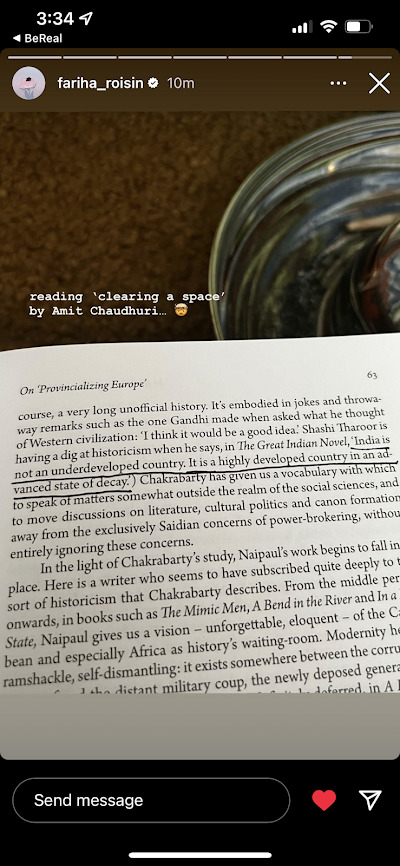#fariha roisin
Text

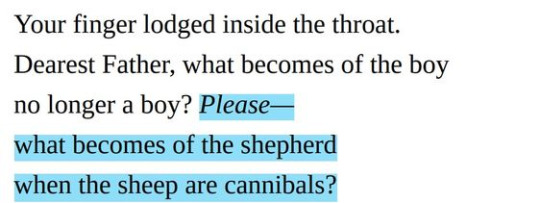
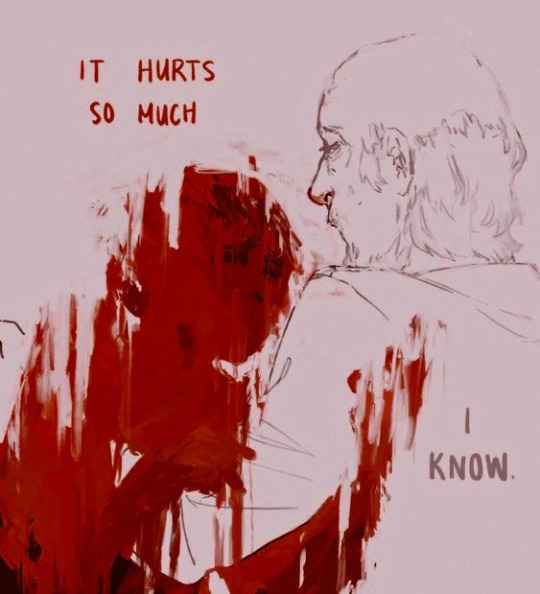
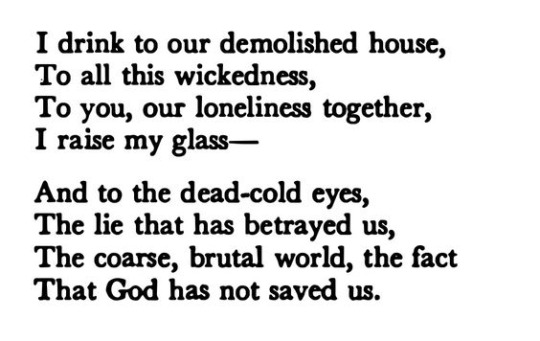

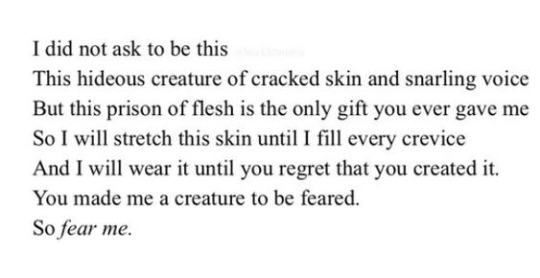




sometimes i forget how much i didn't want to survive
Fariha Róisín How to Cute a Ghost / Ocean Vuong Prayer for the Newly Damned / @/litarnes (on instagram) / Anna Akhmatova The Last Toast / Mary Szybist Incarnadine: Poems / unknown / Anaïs Nin Fire: From "A Journal of Love": The Unexpurgated Diary of Anaïs Nin, 1934-1937 / unknown / Carmen Maria Machado In the Dream House / Langston Hughes Good Morning, Revolution: Uncollected Social
#been struggling lately so here we are#on loneliness#on loss#on emotion#on sadness#on not wanting to live#on giving up#on letting go#web weave#web weaving#poetry compilation#poetry#poem#words#writing#text#quote#fariha roisin#how to cure a ghost#ocean vuong#prayer for the newly damned#anna akhmatova#the last toast#mary szybist#incarnadine#anais nin#a journal of love#carmen maria machado#in the dream house#langston hughes
1K notes
·
View notes
Text
Writers Against the War on Gaza (WAWOG) is an ad hoc coalition committed to solidarity and the horizon of liberation for the Palestinian people. Drawing together writers, editors, and other culture workers, WAWOG hopes to provide ongoing infrastructure for cultural organizing in response to the war. This project is modeled on American Writers Against the War in Vietnam, an organization founded in 1965.
Statement of Solidarity
October 26, 2023
Israel’s war against Gaza is an attempt to conduct genocide against the Palestinian people. This war did not begin on October 7th. However, in the last 19 days, the Israeli military has killed over 6,500 Palestinians, including more than 2,500 children, and wounded over 17,000. Gaza is the world’s largest open-air prison: its 2 million residents—a majority of whom are refugees, descendants of those whose land was stolen in 1948—have been deprived of basic human rights since the blockade in 2006. We share the assertions of human rights groups, scholars, and, above all, everyday Palestinians: Israel is an apartheid state, designed to privilege Jewish citizens at the expense of Palestinians, heedless of the many Jewish people, both in Israel and across the diaspora, who oppose their own conscription in an ethno-nationalist project.
We come together as writers, journalists, academics, artists, and other culture workers to express our solidarity with the people of Palestine. We stand with their anticolonial struggle for freedom and for self-determination, and with their right to resist occupation. We stand firmly by Gaza’s people, victims of a genocidal war the United States government continues to fund and arm with military aid—a crisis compounded by the illegal settlement and dispossession of the West Bank and the subjugation of Palestinians within the state of Israel.
We stand in opposition to the silencing of dissent and to racist and revisionist media cycles, further perpetuated by Israel’s attempts to bar reporting in Gaza, where journalists have been both denied entry and targeted by Israeli forces. At least 24 journalists in Gaza have now been killed. Internationally, writers and cultural workers have faced severe harassment, workplace retribution, and job loss for expressing solidarity with Palestine, whether by stating facts about their continued occupation, or for amplifying the voices of others. These are instances that mark severe incursions against supposed speech protections. Specious charges of antisemitism are leveled against Zionism’s critics; political repression has been particularly aggressive against the free speech of Muslim, Arab, and Black people living in the US and across the globe. As was the case following the September 11th attacks, Islamophobic political fervor and the widespread circulation of unsubstantiated claims has galvanized a US-led coalition of military support for a brutal campaign of violence.
What can we do to intervene against Israel’s eliminationist assault on the Palestinian people? Words alone cannot stop the onslaught of devastation of Palestinian homes and lives, backed shamelessly and without hesitation by the entire axis of Western power. At the same time, we must reckon with the role words and images play in the war on Gaza and the ferocious support they have engendered: Israel’s defense minister announced the siege as a fight against “human animals”; even as we learned that Israel had rained bombs down on densely populated urban neighborhoods and deployed white phosphorus in Gaza City, the New York Times editorial board wrote that “what Israel is fighting to defend is a society that values human life and the rule of law”; establishment media outlets continue to describe Hamas’s attack on Israel as “unprovoked.” Writers Against the War on Gaza rejects this perversion of meaning, wherein a nuclear state can declare itself a victim in perpetuity while openly enacting genocide. We condemn those in our industries who continue to enable apartheid and genocide. We cannot write a free Palestine into existence, buttogether we must do all we possibly can to reject narratives that soothe Western complicity in ethnic cleansing.
We act alongside other writers, scholars, and artists who have expressed solidarity with the Palestinian cause, drawing inspiration from the Palestinian spirit of sumud, steadfastness, and resistance. Since 2004, the Palestinian Campaign for the Academic and Cultural Boycott of Israel (PACBI) has advocated for organizations to join a boycott of institutions representing the Israeli state or cultural institutions complicit with its apartheid regime. We call on all our colleagues working in cultural institutions to endorse that boycott. And we invite writers, editors, journalists, scholars, artists, musicians, actors, and anyone in creative and academic work to sign this statement. Join us in building a new cultural front for a free Palestine.
Signed,
WAWOG Interim Organizing Committee
Hannah Black
Ari Brostoff (Senior Editor, Jewish Currents)
Elena Comay del Junco
Kyle Dacuyan (Executive Director, Poetry Project)
Kay Gabriel (Editorial Director, Poetry Project)
Kaleem Hawa
E. Tammy Kim
Shiv Kotecha
Wendy Lotterman (Associate Editor, Parapraxis)
Muna Mire
Perwana Nazif
Brendan O'Connor
Alex Press (Staff Writer, Jacobin)
Sarah Nicole Prickett
Dylan Saba
Zoé Samudzi (Associate Editor, Parapraxis)
Jasmine Sanders
Claire Schwartz (Culture Editor, Jewish Currents)
Janique Vigier
Harron Walker
Chloe Watlington
Gabriel Winant (Department of History, University of Chicago)
Audrey Wollen
Hannah Zeavin (Founding Editor, Parapraxis)
Signed, In Solidarity
Fatimah Warner (Noname)
Saul Williams
Susan Sarandon
Janeane Garofalo
Gael García Bernal
Danez Smith
Ocean Vuong
Aria Aber
Saidiya Hartman
China Miéville
+ full list here
#writers against the war on gaza#wawog#free palestine#this letter is the one#you know how i encountered this when you see one of the people who signed#text#noname#susan sarandon#saul williams#gael garcia bernal#ocean vuong#joel kim booster#what a pleasant surprise#patti harrison#fariha roisin#zoe samudzi
234 notes
·
View notes
Text
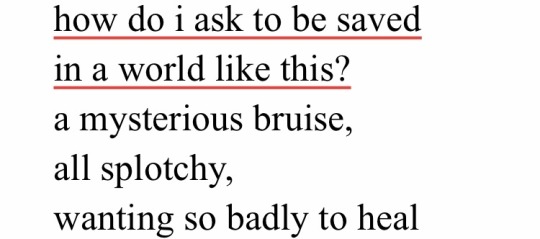
Fariha Róisín, from How to Cure a Ghost; “after the loss, take two”
[Text ID: “how do i ask to be saved / in a world like this? / a mysterious bruise, / all splotchy, / wanting so badly to heal”]
#fariha roisin#healing#sadness#survival#excerpts#writings#literature#poetry#fragments#selections#words#quotes#typography#poetry collection
809 notes
·
View notes
Text

“sadness is a vacuum”
How to Cure a Ghost, Fariha Róisín
21 notes
·
View notes
Text

* * * *
“my greed for love,
for my own perfection,
reeks of desperation,
but is me and i am holy
in my unholiness, so
wonderfully messy,
that i can’t help but begin
to win myself over.”
from “Self-Portraiture” by Fariha Róisín, in You Don’t Have to Be Everything: Poems for Girls Becoming Themselves edited by Diana Whitney, p. 34
[alive on all channels]
#poem#poetry#self-portrait#Fariha Roisin#Diana Whitney#alive on all channels#words and writing#my favorites#Virginia Woolf
11 notes
·
View notes
Photo
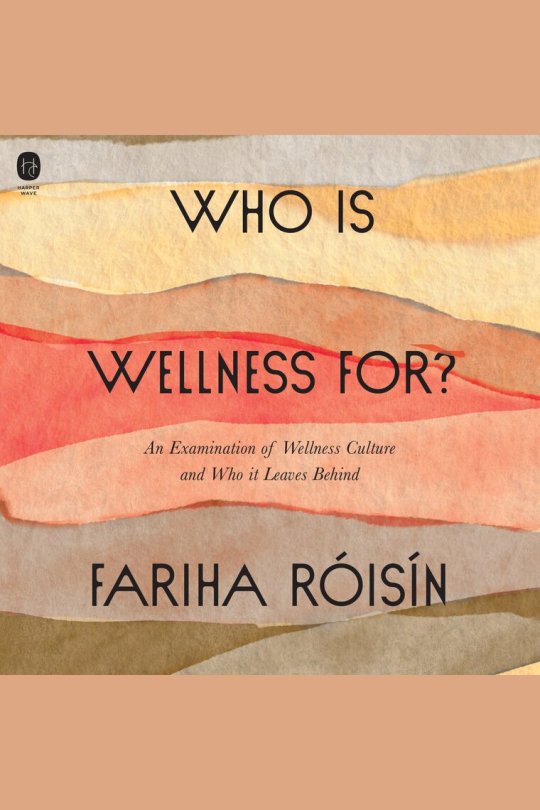
(via Who Is Wellness For? by Fariha Roisin - Audiobook | Scribd)
#gonna check this out#not interested in all the topics/chapters#but i can read some and not others#fariha roisin#i don't like how the word wellness is used these days
17 notes
·
View notes
Text


Fariha Róisín, Who Is Wellness For?: An Examination of Wellness Culture and Who It Leaves Behind
17 notes
·
View notes
Quote
I see God in everything. In nature, in love, and in loss. The writing that came forward for this book … was all channeled in service to the promise I made to God. This is the purpose I’m trying to fulfill during my short time on this earth.
Fariha Róisín
8 notes
·
View notes
Text

Who is Wellness For?, Fariha Róisín
17 notes
·
View notes
Note
Can u pls pls pls do web weaving on the struggle to be alive everyday,trying, failing,losing ur mind but still going on with the pain

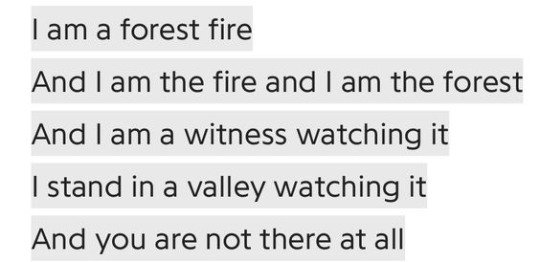
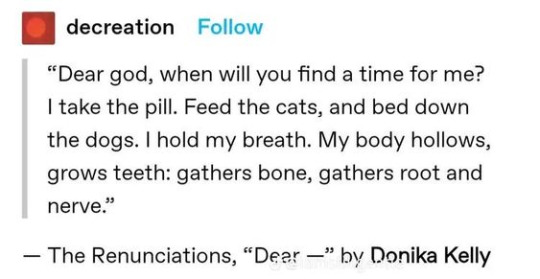

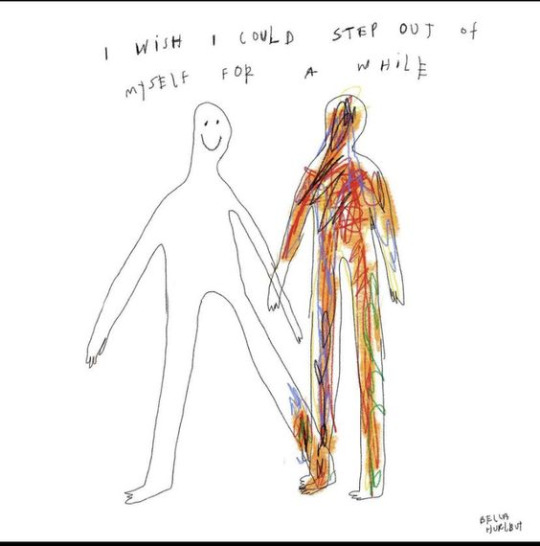
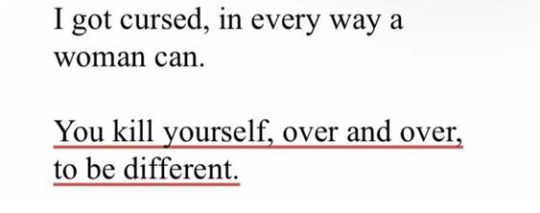

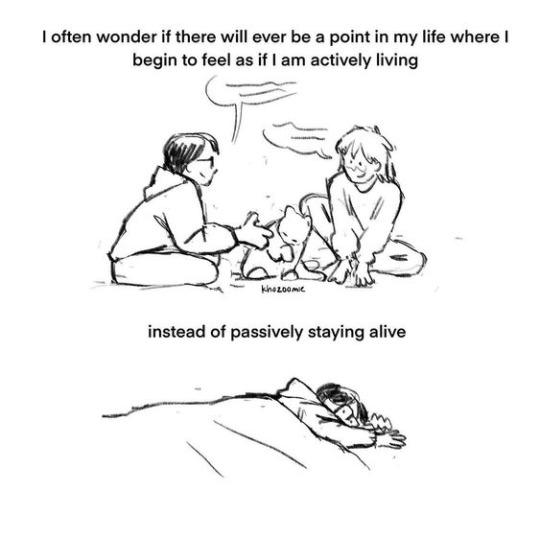

pinterest / Mitski A Burning Hill / Donika Kelly Dear-; The Reunciations / Nora Sakavic The Foxhole Court / pinterest / pinterest / Fariha Róisín How to Cure a Ghost / pinterest / Gabrielle Bates & Jennifer S. Cheng So We Must Meet Apart
#on loneliness#on sadness#on emotion#web weave#poetry compilation#literature#mitski#a burning hill#donika kelly#dear#the reunciations#nora sakavic#the foxhole court#all for the game#fariha roisin#how to cure a ghost#gabrielle bates#jennifer s cheng#so we must meet apart#words#spilled poetry#spilled thoughts#spilled ink#poem#dark academia#writing#dark academia quote#dark academia poetry#poetry
146 notes
·
View notes
Photo
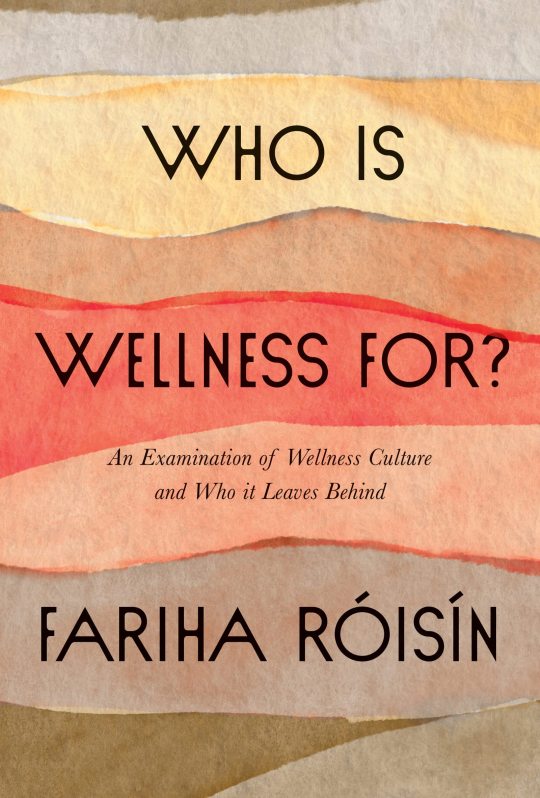
Who Is Wellness For?: An Examination of Wellness Culture and Who It Leaves Behind
By Fariha Roisin.
2 notes
·
View notes
Text

Fariha Róisín, from How to Cure a Ghost; “after the loss”
[Text ID: “i am sometimes drifting like / a lost person, with no heir / or heirloom, a fog / of longing.”]
#fariha roisin#lost#longing#excerpts#writings#literature#poetry#fragments#selections#words#quotes#typography#poetry collection
804 notes
·
View notes
Text

“ammu, after the smoke”
from How to Cure a Ghost, Fariha Róisín
16 notes
·
View notes
Text

Artwork: Holly Warburton
* * * * *
"I thought I had been surviving, and yet, what I was really doing was hanging by a string, loosely holding myself from collapsing. I was always on the verge, and I could feel that friction in my soul."
— Fariha Róisín, from Who Is Wellness For?: An Examination of Wellness Culture and Who It Leaves Behind
[Belles-lettres]
5 notes
·
View notes

